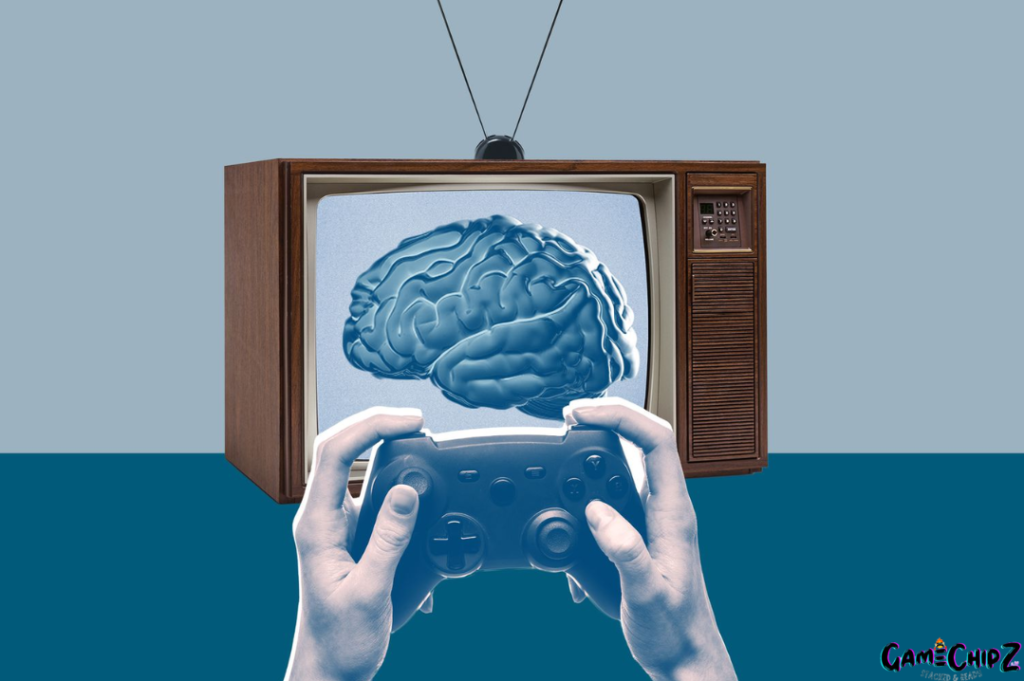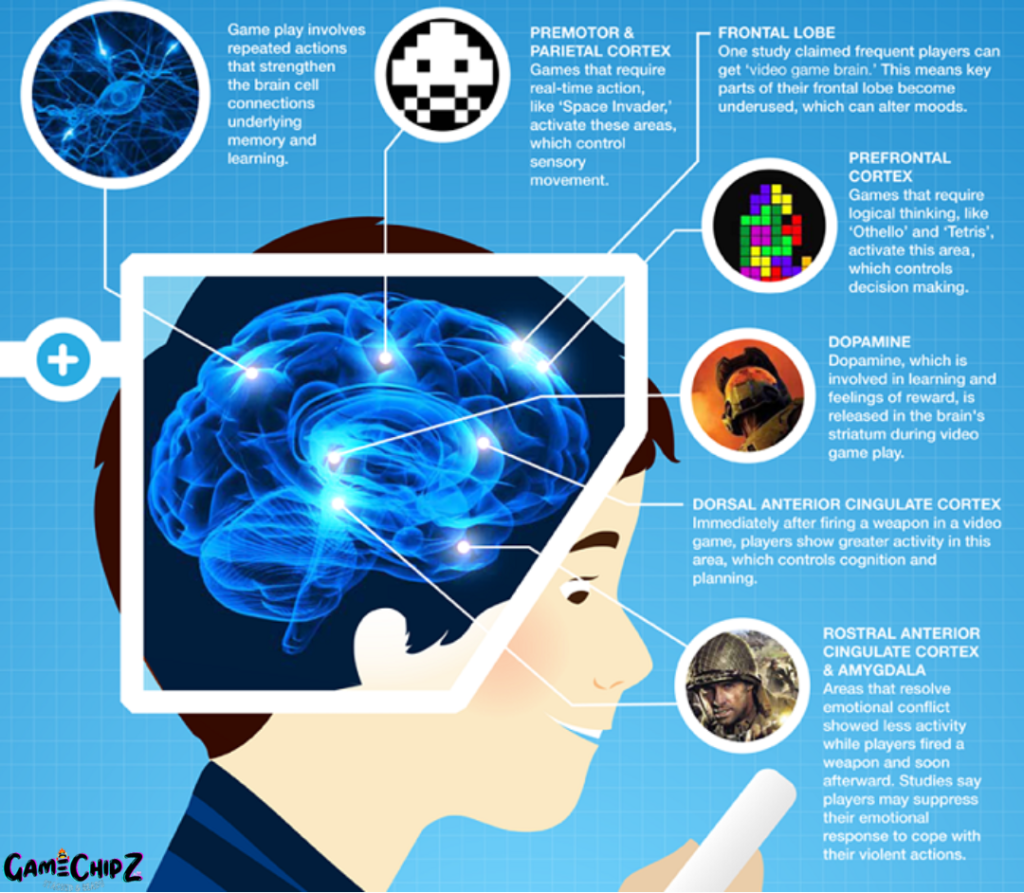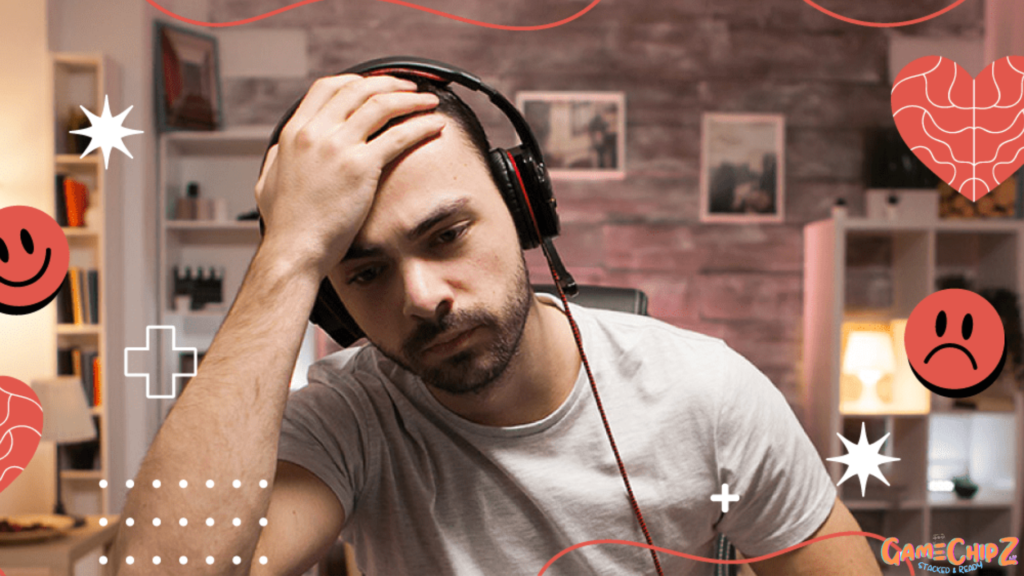The world of gaming has evolved significantly over the past few decades, transforming from a niche hobby into a global phenomenon that captivates billions of people. With the rise of sophisticated gaming technologies and immersive game designs, the allure of a person playing video games has become increasingly irresistible. However, as gaming continues to permeate our lives, a critical question emerges: how does gaming affect our brains?

From the thrill of conquering virtual worlds to the satisfaction of solving intricate puzzles, gaming can have profound impacts on our cognitive abilities, emotional well-being, and social interactions. The concept of the “gaming mind” has become a topic of intense interest, with researchers and gamers alike seeking to understand the complex interplay between gaming and brain function.
In this article, we delve into the fascinating realm of how the gaming mind affects your brain, exploring the cognitive benefits, potential risks, and reasons why a gamer suddenly stops playing. Whether you’re a seasoned gamer or a curious observer, this journey into the gaming mind promises to reveal surprising insights into the intricate relationship between gaming and our most vital organ – the brain.
Cognitive Benefits of Gaming
Enhanced Attention
The gaming mind can significantly improve attentional abilities, particularly sustained and selective attention. Regular gamers have been found to display improvements in these types of attention, with their brains requiring less activation to stay focused on demanding tasks. This enhancement is crucial for tasks that require prolonged concentration and the ability to filter out irrelevant information.
For instance, a study published in the British Journal of Psychology demonstrated that regular gamers exhibited faster reaction times and better performance in tasks assessing executive function and working memory compared to non-gamers. These improvements suggest that the gaming mind can enhance cognitive flexibility and the ability to switch between different tasks efficiently.
Improved Visuospatial Skills

A person playing video games can also enhance visuospatial skills, which are essential for understanding visual and spatial relationships among objects. Games like “Tetris” and first-person shooter titles have been shown to produce stable performance gains on visuospatial ability tests. Moreover, research indicates that video game training can increase the size and competence of parts of the brain responsible for visuospatial skills, such as the right hippocampus.
The benefits of visuospatial training extend beyond gaming itself. For example, a study found that participants who completed spatial training via video games showed improved learning in visuospatial science domains, such as understanding plate tectonics. This suggests that gaming can have a positive impact on educational outcomes in subjects that rely heavily on visuospatial abilities.
Boosted Memory

Gaming can also improve memory, particularly working memory and visuospatial memory. Regular gamers have been found to perform better in tasks that require remembering and manipulating information, such as the Corsi block-tapping task. Additionally, research has shown that playing 3D video games can boost the formation of memories, with participants in one study improving their memory test scores by 12% after playing 3D games for 30 minutes per day for two weeks.
These improvements in memory are not limited to short-term effects. Studies have found that cognitive training through video games can lead to lasting changes in brain function and structure, even in older adults. For example, a study published in Nature found that older adults who played a specially designed 3D video game showed significant improvements in working memory and sustained attention that were maintained six months after training.
Cognitive Flexibility and Fluid Intelligence
Gaming can also enhance cognitive flexibility and fluid intelligence. Strategy video games, in particular, have been shown to improve cognitive control, reasoning, and higher-order cognitive skills, potentially staving off dementia and Alzheimer’s disease. Additionally, research has found that video game practice time is positively related to fluid intelligence, mental flexibility, planning, and visuospatial processing skills.
These cognitive benefits are not limited to specific age groups. Studies have found that a person playing video games can improve cognitive performance in both young and older adults, suggesting that gaming can be a valuable tool for cognitive training across the lifespan.
Key Risks:
Addiction

- Excessive gaming can lead to addiction, characterized by functional and structural alterations in the neural reward system.
- Signs of gaming addiction include spending increasing amounts of time playing games, neglecting other activities, and experiencing withdrawal symptoms when unable to play.
- Gaming addiction can have severe consequences, including social isolation, decreased academic or work performance, and negative impacts on mental health.
Negative Impact on Physical Health
- Gaming can lead to physical health issues such as repetitive strain injuries, eye strain, headaches, and obesity due to sedentary behavior.
- Prolonged gaming sessions can result in poor posture, leading to back and neck problems.
- Regular breaks and maintaining a balanced lifestyle are essential to mitigate these risks.
Mental Health Concerns
- Excessive gaming can lead to increased symptoms of depression and anxiety, particularly in individuals who use gaming as a means to escape from real-life problems. Studies have shown that excessive gaming can disrupt sleep patterns, leading to insomnia and other sleep disturbances that can have severe effects on mood and cognitive function
- Excessive gaming can lead to social isolation, particularly in adolescents and young adults. This can result in fewer opportunities to connect with others and build strong relationships, leading to feelings of loneliness and a lack of belonging. Gaming can cause poor emotional regulation, leading to increased aggression, irritability, and mood swings. This is particularly true for games that involve violence or competitive elements
- It is important for gamers to be aware of these risks and seek support if they experience negative impacts on their mental health.

The Importance of Moderation
Balanced Gaming Habits
- Gaming in moderation is key to avoiding the negative impacts on mental health. Limiting the number of hours spent gaming and engaging in healthy activities such as exercising, socializing, and maintaining a balanced lifestyle can help mitigate these risks.
- Education is essential for preventing gaming-related injuries and mental health issues. Gamers need to be educated on how to protect their physical and mental health, including taking breaks, stretching, eating healthy snacks, and resting when necessary.
Seeking Help
Professional Support
- If gaming is negatively impacting mental health, it is essential to seek professional support. This can include talking to a therapist, joining support groups, or participating in clinical programs designed to address gaming addiction and its related mental health issues.
- Early identification and treatment of gaming addiction are critical in preventing severe outcomes. By seeking help, individuals can take the first step towards a healthier and more fulfilling life, free from the negative impacts of excessive gaming.
Reasons Why a Gamer Suddenly Stops Playing
Gaming can be an all-consuming hobby, but sometimes, even the most avid gamers suddenly stop playing. Understanding the reasons behind this phenomenon can provide insights into the complex relationship between gaming and personal life.
Key Reasons:
- Loss of Interest
- Overexposure to gaming can lead to a decrease in enjoyment and a loss of interest. When games become too repetitive or lack new challenges, gamers may find themselves no longer engaged.
- The gaming industry’s constant release of new titles can also lead to a sense of fatigue, making it difficult for gamers to maintain their enthusiasm.

- Health Concerns
- Realization of the negative physical and mental health impacts of excessive gaming can prompt gamers to stop playing. This includes concerns about eye strain, carpal tunnel syndrome, obesity, and mental health issues such as anxiety and depression.
- Gamers may decide to prioritize their health and well-being over their gaming habits, leading to a sudden cessation of gaming activities.
- Other Life Commitments
- Gamers may need to prioritize other aspects of their lives, such as work, education, or social relationships. As responsibilities increase, the time available for gaming decreases, leading some gamers to stop playing altogether.
- Life changes, such as moving to a new location, starting a family, or experiencing a significant career shift, can also cause gamers to reevaluate their priorities and allocate their time differently.
The Impact of Stopping
- Withdrawal Symptoms
- Some gamers may experience withdrawal symptoms when they stop playing, including irritability, restlessness, and a strong desire to return to gaming.
- These symptoms can be challenging to manage, but understanding the reasons behind the decision to stop gaming can help individuals cope with these feelings.
- Finding New Hobbies
- Stopping gaming can lead to a void in leisure activities, prompting individuals to explore new hobbies and interests.
- Engaging in alternative activities can help former gamers maintain social connections, improve physical health, and discover new passions.
The decision to stop gaming is complex and influenced by various factors. By understanding the reasons behind this decision, gamers and non-gamers alike can gain insights into the dynamic relationship between gaming and personal life. Whether it’s due to a loss of interest, health concerns, or other life commitments, stopping gaming can be a transformative experience that leads to new opportunities and personal growth.
Can Video Games Make You Smarter?
The notion that video games can make you smarter is a topic of ongoing debate. While some argue that gaming is a waste of time, others believe that it can have cognitive benefits. Let’s explore the evidence and find out if video games can indeed make you smarter.

Cognitive Enhancement
- Improved Problem-Solving Skills
- Video games can enhance problem-solving skills by presenting players with complex challenges that require critical thinking and creativity.
- Games like “Portal” and “The Talos Principle” are examples of puzzle games that can improve cognitive abilities such as spatial reasoning and logical thinking.
- Enhanced Memory and Attention
- Certain video games can improve memory and attention by requiring players to remember and manipulate information.
- Games like “Memory Match” and “Brain Age” are designed to improve cognitive functions such as memory, attention, and processing speed.
- Boosted Processing Speed
- A person playing video games can improve processing speed by requiring players to react quickly to changing situations.
- Games like “Call of Duty” and “Overwatch” require players to make rapid decisions and react to fast-paced action.
Educational Potential
- Learning Through Games
- Video games can be used as a tool for learning, making complex subjects more engaging and accessible.
- Games like “Civilization” and “Age of Empires” can teach history, geography, and strategic thinking.
- Improved Academic Performance
- Research has shown that a person playing video games can improve academic performance in subjects such as math and reading.
- A study published in the Journal of Educational Psychology found that playing video games can improve math skills in children.
Brain Plasticity
- Neuroplasticity
- A person playing video games can promote brain plasticity, allowing the brain to reorganize and adapt in response to new experiences.
- Games like “Tetris” and “Pac-Man” can improve cognitive flexibility and promote neural adaptation.
- Cognitive Training
- Video games can be used as a form of cognitive training, improving cognitive functions such as attention, memory, and processing speed.
- Games like “Lumosity” and “Peak” are designed to improve cognitive abilities through interactive exercises.
While video games are often seen as a form of entertainment, they can also have cognitive benefits. By improving problem-solving skills, enhancing memory and attention, and boosting processing speed, video games can make you smarter. Additionally, games can be used as a tool for learning, improving academic performance, and promoting brain plasticity. So, the next time you’re playing your favorite game, remember that you’re not just having fun – you’re also exercising your brain.
Conclusion
The impact of the gaming mind is a complex and multifaceted topic. While gaming can have numerous cognitive benefits, such as improved attention, memory, and processing speed, it also carries potential risks, including addiction, social isolation, and negative impacts on physical and mental health.
By understanding the effects of gaming on the brain, we can harness its potential to improve cognitive abilities, enhance educational outcomes, and promote brain plasticity. However, it is essential to maintain a balanced lifestyle, prioritize other aspects of life, and be aware of the potential risks associated with excessive gaming.
As the gaming industry continues to evolve, it is crucial to recognize the importance of responsible gaming practices, including setting limits, taking breaks, and engaging in other activities that promote physical and mental well-being.
Ultimately, the relationship between gaming and the brain is a dynamic and reciprocal one. By being mindful of the potential benefits and risks, we can use gaming as a tool to improve our cognitive abilities, enhance our lives, and promote overall well-being.
Whether you’re a seasoned gamer or just starting to explore the world of gaming, remember that the key to a healthy gaming habit is balance, moderation, and awareness. So, go ahead, grab your controller, and game on – but do it responsibly and with a mindful approach to your overall well-being.
FAQ
Can gaming really improve cognitive skills?
Yes, research has shown that the gaming mind can improve cognitive skills such as attention, memory, and processing speed. Games that require critical thinking, problem-solving, and strategic planning can enhance cognitive abilities.
How much gaming is too much?
Excessive gaming can lead to negative impacts on physical and mental health. The American Academy of Pediatrics recommends that children aged 2-18 years old limit their screen time to 1-2 hours per day. Adults should also be mindful of the gaming mind and habits and ensure they are not neglecting other aspects of their lives.
Can gaming be addictive?
Yes, gaming can be addictive. Gaming addiction, also known as internet gaming disorder, is a recognized mental health condition characterized by excessive and compulsive gaming habits. If you’re concerned about the gaming mind or those of someone you know, seek professional help.
Are all games created equal when it comes to cognitive benefits?
No, not all games are created equal. Games that require critical thinking, problem-solving, and strategic planning are more likely to have cognitive benefits than games that are purely entertainment-focused. Look for games that challenge the gaming mind and promote learning.
Can gaming improve academic performance?
Yes, research has shown that gaming can improve academic performance in subjects such as math and reading. Games that teach complex subjects in an engaging and interactive way can be a valuable tool for learning.
Is gaming a waste of time?
Not necessarily. While excessive gaming can be a waste of time, moderate gaming can have cognitive benefits and be a valuable hobby. It’s essential to maintain a balanced lifestyle and prioritize other aspects of your life, such as work, education, and social relationships.
Can gaming be used as a form of cognitive training?
Yes, the gaming mind can be used as a form of cognitive training. Games that are designed to improve cognitive abilities such as attention, memory, and processing speed can be a valuable tool for cognitive training.
Are there any negative impacts of gaming on mental health?
Yes, excessive gaming can have negative impacts on mental health, including increased symptoms of depression, anxiety, and stress. It’s essential to be aware of these risks and maintain a balanced lifestyle. If you’re concerned about your mental health, seek professional help.


